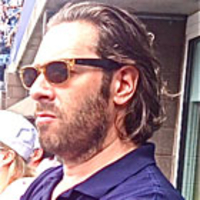Shia LaBeouf just dropped out of his theater debut, a play called Orphans that he was supposed to star in with Alec Baldwin. Various reports detail friction between the two stars, wall-breaking during rehearsals, and generally insane actor-type behavior. In true post-modern fashion, the young LaBeouf posted his side of the story on Twitter, copying multiple email exchanges and his own articulate apologies. To me, the whole episode was rather unsurprising in many ways; I had worked with LaBeouf on his first movie, and even back then, all of the writing was clearly on the wall.

In 2002 I was on one of the first reality-TV shows, HBO’s Project Greenlight. The show was a contest for first-time writers and directors to make a feature film. (I served as an executive producer on the movie.) The project we chose that year was about a high school boy with a fascination for military reenactments, and we set about casting for the film lead with the TV cameras duly rolling.
Every hot young actor in town auditioned. Back then, the WB was the network of choice for pretty young things, and seemingly every guy on the network showed up at our door. Chiseled good looks, muscular physiques, perfect teeth—exactly the way everyone looked in my high school. There was one kid, though, who couldn’t have been more different than the others: skinny, quirky, smart-mouthed—he was the polar opposite of the cool L.A. hunk.
I haven’t had a lot of these moments in my career, but it was obvious right away that the kid on the audition tape was uniquely talented. There was something completely idiosyncratic about him but in a wholly genuine way. I did a double take when I realized the biggest credit on his resume to date was a Disney comedy TV series called Even Stevens.
Usually kids who are coming off of a Disney show are desperate to do something completely different, break away from the childhood noose. Most, like Miley Cyrus, are obvious in their quest; they accelerate their entré into adulthood by acting like someone in a puberty video shot at warp speed. The result is normally neither convincing nor effective, and they end up in between audiences, too faux-grown for real adults and not wholesome enough anymore for their core fans.
Shia’s path was different. You could see that he wore his life experiences heavily—especially for a teen—but was also unafraid to embrace those scars. It was as if he knew back then that it would serve him incredibly well as an actor but also lead to a different, more complicated sort of life.
It’s also what made him immediately stand out. I watched him on set, saw the way he interacted with adults and with his castmates. Since it was a film full of teens and the directors themselves were young, you’d expect a lot of hijinks and fun. There was certainly a fair share of that, but almost none of it centered around our young star. When his supporting crew would be laughing, telling stories, or just chilling, Shia was constantly focused on the movie itself. It quickly became apparent that he cared as much as the producers did about us getting all of the necessary material, making our days and other things that rarely seemed to matter to actors twice his age.
There was a memorable moment in the TV show when Shia completely lost his cool—not at a P.A. for bringing the wrong drink order; he was distraught that we ran out of time and didn’t finish the day’s work. The possibility that our missing that scene might negatively impact the overall movie made him literally beside himself.
The only way I can describe it is being uncomfortably mature. You don’t expect 16-year-old kids (or at least you didn’t back then) to be so world-weary, to be so familiar with people and poverty and situations and drugs and life. Typically, he was honest about his background—his father had longstanding issues with addiction, and though he was incredibly close to his kind-hearted, bohemian mother, they had clearly been through their own wars together. You could see at once how far this deep well of stuff would take him in his acting career.
And you could see how things would be hard for him.
The Project Greenlight movie was meant to be a clever teen comedy, with the battle reenactments standing in as a metaphor for the daily tribulations of high school. The tagline: “When you’re 17, every day is war.” There were lighthearted moments during the shoot but some unexpectedly heavy ones as well. A pivotal scene in the movie called for the veteran actor playing Shia’s father to unload with rage on his teenage son. After much discussion, the directors decided to shoot it at a very tight angle—with the logistical result placing the two actors mere inches apart. As the older actor started to berate his son, you could feel the tension in the room, and it felt much more real and dramatic than it had any right to be. Shia wasn’t playing a wounded son, he was one. I still remember the look of pain in his eyes; it was that hard to watch. Things like that stick with you over the years.
I read about the recent backstage drama at the theater, and it makes perfect sense. The play is about violence, machismo, poverty, desperation, and surrogate-father figures. Mix that with complicated actors truly living their craft and the current headlines become clear.
Not much has changed since his Battle of Shaker Heights.






